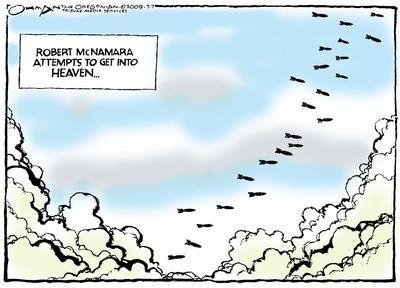- MENU
- HOME
- SEARCH
- WORLD
- MAIN
- AFRICA
- ASIA
- BALKANS
- EUROPE
- LATIN AMERICA
- MIDDLE EAST
- United Kingdom
- United States
- Argentina
- Australia
- Austria
- Benelux
- Brazil
- Canada
- China
- France
- Germany
- Greece
- Hungary
- India
- Indonesia
- Ireland
- Israel
- Italy
- Japan
- Korea
- Mexico
- New Zealand
- Pakistan
- Philippines
- Poland
- Russia
- South Africa
- Spain
- Taiwan
- Turkey
- USA
- BUSINESS
- WEALTH
- STOCKS
- TECH
- HEALTH
- LIFESTYLE
- ENTERTAINMENT
- SPORTS
- RSS
- iHaveNet.com
by Jules Witcover

When former Kennedy and Johnson Secretary of Defense Robert S. McNamara died at age 93, he was widely remembered, and castigated, as "the architect of the Vietnam War." That title was not precisely accurate, President Dwight D. Eisenhower having sent the first U.S. military advisers to South Vietnam in late 1955.
But undeniably the commitment grew under John F. Kennedy and most emphatically in 1964 under Lyndon B. Johnson, who used the misinterpreted Gulf of Tonkin incident to draw a blank check from
In any event, McNamara's supreme self-confidence spilling over into arrogance, and his self-discipline and reliance on data that came to his desk as a one-time
McNamara came to the Pentagon, however, ill equipped emotionally to be the most powerful warlord in modern history. His benign background belied that role thrust upon him by Kennedy, who was looking for the right man not to wage a war, but to bring order and discipline to the military establishment.
I was a reporter at the Pentagon during McNamara's early years there, marked by the Cuban missile crisis. He served on JFK's Executive Committee that came up with the quarantine that turned back missile-bearing Soviet ships and averted the world's first nuclear exchange.
McNamara's myopia or naivete in some matters was seen in his holding Pentagon briefings on the unfolding and frightening crisis. Correspondents from Tass, the Soviet news agency, and other Russian news outlets were present -- until that presence was noted and ended.
I went briefly to South Vietnam in 1965, as the American buildup was just getting underway with the dispatch of U.S. troops and more military advisers. I was part of a contingent from the Pentagon press room sent under
Mostly, the stories written reflected the same discouraging impressions conveyed by our colleagues already on the ground. Sending us reflected the dissatisfaction of the McNamara Pentagon with the coverage the American effort was getting on the war.
As American deaths and other casualties in Vietnam mounted, McNamara remained resolutely determined to press the war even as, it was learned only some 30 years later, he had become convinced the war was unwinnable, and had so told Johnson.
During this period, McNamara initiated a program known as civic action, which sought to combat poverty and misery in other impoverished places where there were American forces. It always seemed to represent unknowing or knowing penance on McNamara's part for the huge death and destruction wrought in Vietnam by the policies employed under his Pentagon watch.
McNamara enjoyed a close friendship with the Kennedy family, and after John Kennedy's death with his brother Robert, who became an outspoken opponent of Johnson on the Vietnam War and challenged LBJ for the Democratic presidential nomination in 1968.
That closeness drew the suspicion of LBJ, and McNamara suddenly "resigned" from the Pentagon in late
Years later I would see him briskly walking through downtown Washington streets, often in shorts, on some intense mission. A few years ago I spotted him sitting alone on a bench on the
He was friendly and even seemed meek, but uninterested in engaging in any reminiscences of that time of his greatest power and hopes, before he came to admit to himself what he wrote in his memoir -- that he and Johnson, in pursuing victory in Vietnam at the terrible human cost of 58,000 American lives, had been "wrong, terribly wrong."
Jules Witcover's book, on the Nixon-Agnew relationship, "Very Strange Bedfellows: The Short and Unhappy Marriage of Richard Nixon and Spiro Agnew."
© TRIBUNE MEDIA SERVICES, INC
WORLD | AFRICA | ASIA | EUROPE | LATIN AMERICA | MIDDLE EAST | UNITED STATES | ECONOMICS | EDUCATION | ENVIRONMENT | FOREIGN POLICY | POLITICS
Robert S. McNamara's Tortured Life